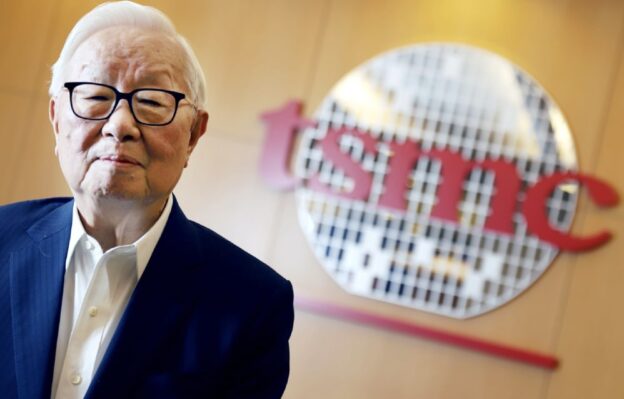Morris Chang, founder of TSMC, launched his full autobiography on December 9th. Beyond the book’s rich content, Chang shared his insight on the semiconductor industry’s competitive landscape.
Morris Chang, the iconic founder of Taiwan Semiconductor Manufacturing Company (TSMC), marked the release of his autobiography with a book launch event in Taipei on December 9. During a fireside chat with the publisher CWGV CEO Lixing Wang, Chang offered profound insights into the semiconductor industry’s competitive landscape, sharing candid reflections on Intel, Samsung, and Nvidia.
Chang recounted insider tales of the industry, reflecting on his close friendship with Intel’s early leadership, the circumstances surrounding Pat Gelsinger’s selection as CEO, and his invitation to Nvidia’s Jensen Huang to join TSMC.
The event brought together Taiwan’s tech elite. Among the TSMC leadership present were Chairman and CEO C.C. Wei, TSMC Foundation Chairman Tseng Fan-Cheng, HR head Lora Ho, Deputy Co-COO Cliff Hou, and Materials Management VP Venessa Lee. Prominent figures from Taiwan’s tech industry also attended, accompanied by their spouses, including Quanta Computer Founder and Chairman Barry Lam, Sercom Corp. Founder Paul Wang, Mitac-Synnex Group Chairman Matthew Miau, PSMC Chairman Frank Huang, and Yageo Chairman Pierre Chen.
Intel’s Challenges: Leadership or Strategy at Fault?
Chang opened by reminiscing about his long-standing friendship with Intel’s co-founders, Robert Noyce and Gordon Moore. “We were close companions in the early days—attending conferences, dining, and even singing together,” he shared, noting that this camaraderie was even chronicled in Chip War by Chris Miller.
However, Chang remarked that the relations between TSMC and Intel shifted under current CEO Pat Gelsinger, saying, “It seemed like he wanted to be adversarial.” He revealed that Intel has not approached him for advice, adding, “Frankly, I don’t want them to.”
Chang criticized Intel’s 2021 leadership transition, describing how the board, dissatisfied with the previous CEO, chose Gelsinger after inviting several candidates to present. “It felt like a speech competition rather than a strategic decision,” he said, suggesting Gelsinger’s communication skills outweighed his strategic vision.
On Intel’s future, Chang admitted uncertainty about whether the company’s challenges stem from poor strategy or execution. He emphasized that Intel must pivot toward AI to remain relevant, moving away from its struggling wafer foundry ambitions.
Reflecting on an incident from 2008, Chang recounted inviting Intel’s then-chairman Craig Barrett to join TSMC’s board. Barrett declined, citing loyalty to Intel and potential conflicts should the two companies ever compete. “Some board members regretted it, but Carly Fiorina reassured us, saying, ‘We’ll do just fine without him,’” Chang noted.
Samsung’s Struggles: Strategic and Political Hurdles
Chang recalled a pivotal 1989 breakfast with Samsung’s then-chairman Lee Kun-hee, Acer founder Stan Shih, and other business leaders. During the meeting, Lee suggested Taiwanese firms collaborate with Samsung on memory chip production due to perceived limitations in Taiwan’s resources.
Taiwan’s national memory project eventually faltered, with TSMC’s subsidiary, Vanguard International Semiconductor, exiting the memory business by 2000 due to declining DRAM prices and limited design talent. This allowed TSMC to refocus on wafer foundry services.
Chang contrasted this with Acer’s ill-fated partnership with Texas Instruments on DRAM production, which left Acer stranded when TI exited the memory business. “Better the devil you know than the devil you don’t,” Chang reflected, implying that a partnership with Samsung might not have fared better.
He also criticized Samsung’s strategic flaw of technology and pointed to South Korea’s recent political instability as a further impediment to its operations.
A Surprising Invitation to Nvidia’s Jensen Huang
One of the most surprising revelations from Chang’s autobiography was his 2013 invitation to Nvidia CEO Jensen Huang to join TSMC. At the time, Nvidia’s market value was a mere $9 billion, a fraction of TSMC’s $90 billion valuation.
Chang recounted that Nvidia was struggling post-2008 financial crisis, with its stock price falling to $1.55 amid weak PC demand. Huang himself admitted he felt so dejected that he didn’t want to leave his house or even get out of bed.
Chang admired Huang’s visionary leadership and professionalism, describing him as part of the second generation of semiconductor leaders who prioritized design and computer science over manufacturing.
Huang declined the invitation politely by telling Chang that “he already got a job”. However, even if he was interested, legal hurdles would make the transition impossible. Huang’s 7.5% stake in Nvidia posed a significant conflict of interest, as divesting his holdings would have been impractical.
Huang reportedly joked about whether TSMC’s current CEO, C.C. Wei, might feel slighted by the story. Chang replied with a laugh, “He probably won’t mind.”
A Lifetime of Leadership and Insight
Through personal anecdotes and professional analysis, Morris Chang’s autobiography offers a rare glimpse into the intricacies of the semiconductor industry’s competitive relationships. From Intel’s strategic missteps to Samsung’s challenges and Nvidia’s rise, Chang’s reflections underscore the importance of strategic foresight and leadership.
These stories not only highlight pivotal moments in TSMC’s history but also showcase Chang’s profound influence on the global semiconductor landscape.
https://english.cw.com.tw/article/article.action?id=3863





